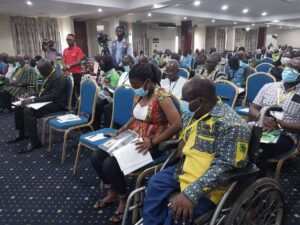
The ARB Apex Bank PLC, a mini central bank that offers support services to the rural and community banks in Ghana, has recorded satisfactory growth in almost all the financial indicators in the 2021 year under review.
The bank recorded improvements in some of the indicators though other major performance indicators of the bank for the year 2021 declined. Total operating income increased by 3.9 percent from GH¢75.3million in 2020 to GH¢78.2million in 2021; however, the bank recorded an impairment loss of GH¢9.2million in 2021 due to the downgrade of overdrawn balances of some distressed RCBs. This significantly impacted the bottom line, throwing it into a net loss of GH¢4.2million.
Total assets of the bank decreased by 6.6 percent from GH¢751.9million recorded in 2020 to GH¢702.3million in 2021. Deposits also decreased by 4.1 percent from GH¢648.5million in 2020 to GH¢621.7million in 2021, with corresponding decline of 3.0 percent in Investments, deceasing from GH¢418.9million in 2020 to GH¢405.8million in 2021.
The Chairman of the Board of Directors, Dr. Toni Aubynn, announced these and more at the 20th Annual General Meeting (AGM) of shareholders held over the weekend in Kumasi.
He revealed that the performance of the banking sector in 2021 pointed to sustained growth in assets, deposits, and investments, alongside improvements in the financial soundness indicators.
In the year under review, total assets grew by 20.4 percent to GH¢179.8billion as at December 2021.
Asset quality, however, continued to reflect the general pandemic-induced repayment challenges, as well as some bank-specific loan recovery challenges.

From the peak of 17.3 percent in August 2021, the NPL ratio eased further to 15.2 percent at end-December 2021.
Comparatively, the NPL ratio was 14.8 percent in December 2020. The industry remained solvent with the average industry CAR of 19.6 percent well above the 11.5 percent regulatory minimum threshold. Core liquid assets to short-term liabilities was 25.9 percent in December 2021 compared to 27.8 percent a year ago.
The rural banking sub-sector, on the other hand, recorded some marginal improvements in the year under review, with total assets growing by 9.5 percent year-on-year from GH¢6.1billion to GH¢6.7billion at the end of December 2021.
Deposits rose by 11.5 percent from GH¢5.3billion in December 2020 to GH¢5.9billion as at December 31, 2021.
Loans and advances also recorded an increase of 22.2 percent from GH¢1.8billion to GH¢2.2billion by December 2021. CAR and NPLs dropped marginally year-on-year to 9.8 percent and 10.8 percent in 2021, from 9.9 percent and 11.3 percent in 2020, respectively.
Rural banks still have significant amounts of money locked up with some Securities and Exchange Commission-regulated institutions – a situation which continues to take a great toll on the industry. Dr. Aubynn has, however, assured affected RCBs that the ARB Apex Bank will continue to engage the regulators to salvage as much of the funds as possible to improve the liquidity position of the industry.
Capitalisation of the ARB Apex Bank
Dr. Aubynn mentioned that the bank’s paid-up capital remaining at GH¢9.2million as at December 2021 is woefully inadequate. Therefore, a number of strategies have been laid down to boost their work.
“The new strategy of your bank is to raise at least GH¢5million annually from our RCBs for the next five years to boost the capital base of your bank. Raising the paid-up capital would allow the bank to run smoothly, and be able to pay dividends to shareholders in the nearest future,” he said.
Highlighting the bank’s performance under the year of review, Managing Director for the ARB Apex Bank, Alex Awuah, noted that despite the negative effects of the COVID-19 pandemic, the bank’s net interest income grew from almost GH₵60million in the year 2020 to GH₵65.71million in 2021, representing a growth of about 10 percent. The total operating income also upended the previous year’s and grew from GH₵75.27million to GH₵78.17million, representing a modest gain of about four percent.
Mr. Awuah, however, noted that the major setback for the bank in the year under review was a slump in the Profit after Tax of GH₵3.81million in the previous year to a loss of GH₵3.56million in 2021.
“This major dip, which represents a jolt to our operations is, however, attributable to our provisioning for the liquidity support given to some ailing RCBs. We are currently reviewing our future support for struggling RCBs to ensure that we do not bring the inefficiencies of non-performing banks on well-performing members, especially because our intention is to work hard so that ARB Apex Bank can return good profits and be able to pay dividends to our esteemed shareholders in the nearest future,” he noted.
Mr. Awuah further elaborated some special interventions being taken up to improve the RCB sub-sector.
Funds for on-lending
The Managing Director mentioned that one of the major challenges facing the RCB sub-sector is the low liquidity and the lack of competitively priced loans for on-lending to member-banks.
“We are all aware of how grants and cheap funds can help in the financial intermediation efforts and rural financial inclusion agenda of the country. This is why in the year under review up till now, the bank has been in an overdrive, pursuing development partners and ‘angel investment’ institutions to mobilise funds in loans and grants to help our RCBs expand the reach of their credit interventions,” he said.
Three of such pursuits are almost yielding results. The first is a US$40million co-financing facility from the International Fund for Agricultural Development (IFAD), for which IFAD has secured funding from the Green Climate Fund to be disbursed at affordable interest rates to smallholder farmers.
This, he said, is to encourage adaptation and climate mitigation practices. Under this arrangement, the bank is required to provide a co-financing support of US$2.5million.
The other is a US$10million facility from the ECOWAS Bank for International Development (EBID), on which work has progressed very fast. He emphasised that one of the first major international assignments he undertook was his visit to Dr. Nana George Agyekum Donkor, President of EBID at the Lome – Togo, Headquarters of the bank.
He disclosed that required documentations had been submitted and awaiting possible disbursement of the facility by December this year. Additionally, the bank has signed a Memorandum of Understanding with the Ministry of Finance that will enable the bank access a US$4million funding facility from the African Development Bank (AfDB) to lend at concessionary rates to support RCBs’ clients under the Social Investment Fund (SIF) umbrella.
Armoured bullion vans
Mr. Alex Awuah, added that the bank has purchased three customised armoured vehicles from its internal resources. Furthermore, with the approval of shareholders to secure a concessionary loan from the Bank of Ghana (BoG), the bank has applied for funding from the central bank to purchase eight additional vehicles to augment their fleet of bullion vehicles across the country. He further expressed confidence that the purchase of the customised ballistic bullion vans would restore integrity and security to its CIT operations.
Agency banking
On Agency banking project which is expected to improve RCBs outreach and enhance greater access to financial services in the rural areas, Mr. Awuah noted that the tender for the Agency, Mobile and Internet Banking Project was opened on 8th June 2022. Subsequently, the tender for Smart Point of Sale (PoS) Devices was opened on Friday, 17th June 2022. The evaluation of both tenders for the selection of service providers are earmarked for July 2022. The two contracts have an estimated value of US$ 3 million.
He added that the Ministry of Finance has constituted a team that is currently evaluating the proposals submitted. The project is expected to complete in September 2023.
Data Centre and T-24 Upgrade
“In respect of the T-24 upgrade from R16 to R20, the ‘major upgrade processes’ have been completed by the project teams inclusive of Inlaks and Temenos, who are our main T-24 partners.
“Two User Acceptance Tests (UATs), with the participation of RCBs, have also been completed. Testing of Interfaces, which would enable T-24 to integrate with other applications such as i-Trans, etc., is also ongoing.
“We are confident that the migration would smoothen the Credit Management process at the RCBs, and also assist us adequately address all the issues we have been grappling with after the upgrade to R16,” Mr Awuah said.









